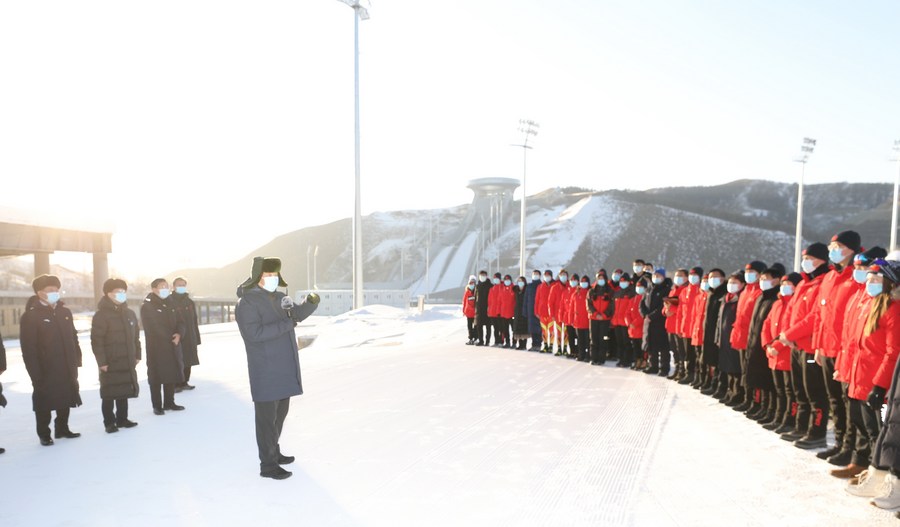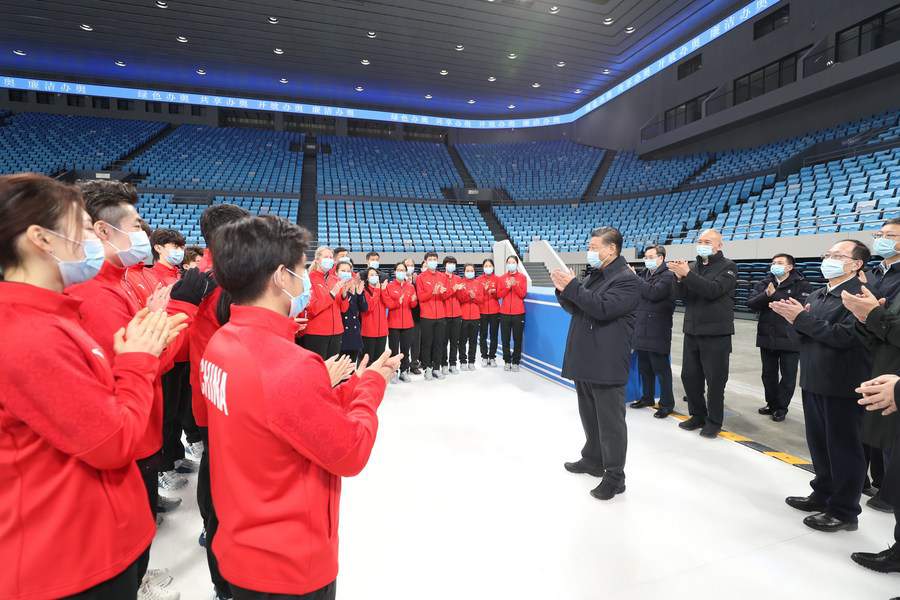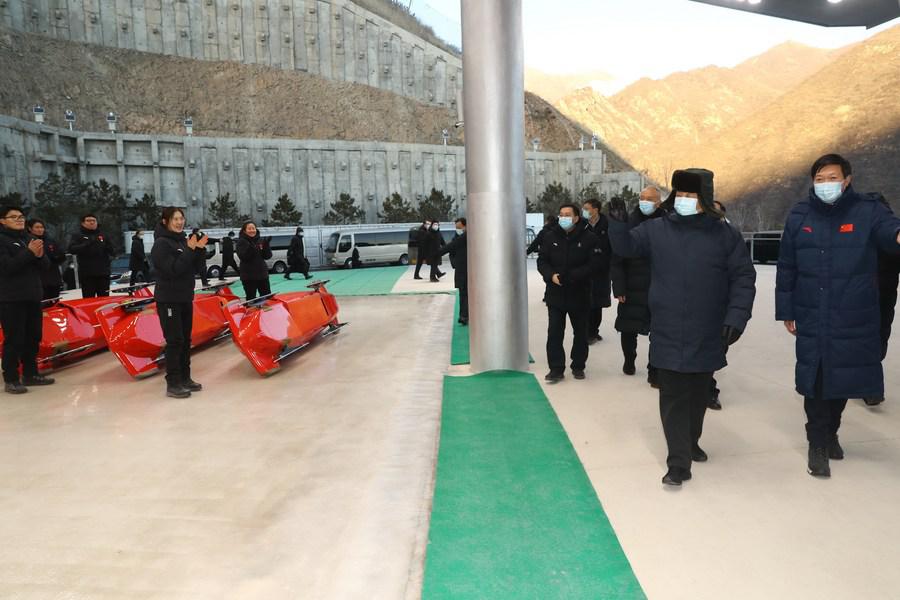


Chinese President Xi Jinping, also general secretary of the Communist Party of China Central Committee and chairman of the Central Military Commission, talks with athletes, coaches and representatives of operation teams and construction staff in the Zhangjiakou competition zone of the Beijing 2022 Olympic and Paralympic Winter Games while visiting the National Biathlon Center in Zhangjiakou, north China's Hebei Province, Jan. 19, 2021. (Xinhua/Wang Ye)
BEIJING, Jan. 20 (Xinhua) -- About one year away from the 2022 Beijing Winter Olympic Games, China is delivering on its bid promises of hosting a "Green Olympics."
Xi Jinping, general secretary of the Communist Party of China Central Committee, started on Monday an inspection tour of the venues and preparation work of the Beijing 2022 Olympic and Paralympic Winter Games in Beijing and Zhangjiakou in Hebei Province.
During the inspection, Xi noted that he was very gratified to see that the preparations for Beijing 2022 are well underway and that the athletes' training is producing obvious results. He also expressed confidence that the 2022 winter sports event will be a success.

Chinese President Xi Jinping, also general secretary of the Communist Party of China Central Committee and chairman of the Central Military Commission, talks with athletes and coaches while visiting the Capital Gymnasium in Haidian District, Beijing, capital of China, Jan. 18, 2021. (Xinhua/Wang Ye)
GREEN POWER
Xi has attached importance to the preparation work of the 2022 Olympics. In a previous inspection of the Shougang Park in Shijingshan District, the seat of the Beijing Organizing Committee for the 2022 Winter Olympics, in February 2019, he stressed the need to stay committed to hosting the Games in a green, sharing, open and clean manner, and to complete all preparation tasks with high standards.
The Shougang Ski Jumping Platform, a venue of the Beijing Winter Olympics, is expected to consume 100,000 kWh of electricity during the snowboarding and freestyle skiing competitions of the Games next year.
"The amount is equal to one month's consumption by 500 three-member households, but all the electricity will come from clean and renewable energy," said Xu Yan, who was in charge of the venue construction.
This will be the first time in the history of the Olympics that all the venues will be wholly powered by green energy. It has been made possible by a flexible DC power grid bringing the capital city electricity generated from the rich wind and solar resources in Zhangjiakou, the co-host city for the 2022 Games.
The power grid is expected to send 22.5 billion kWh of electricity to Beijing each year in the future, or around one-tenth of the city's total power consumption, said Ge Jinshan, an official with the Beijing Major Projects Construction Headquarters Office.
It will help save 7.8 million tonnes of standard coal and reduce carbon dioxide emissions by 2,040 tonnes each year, according to Yang Zhidong, an official responsible for the Winter Olympic Games with the State Grid Beijing Electric Power Company.

Chinese President Xi Jinping, also general secretary of the Communist Party of China Central Committee and chairman of the Central Military Commission, visits the National Sliding Center in Yanqing District, Beijing, capital of China, Jan. 18, 2021. (Xinhua/Ju Peng)
GREEN VENUES
In line with the "Green Olympics" initiative, the venues of the Beijing 2022 Games are applying more green technologies to reduce energy consumption as well as the impact on the environment. By the end of 2020, all of the 12 competition venues for the Games had been built.
Beijing has introduced carbon dioxide refrigerants for ice-making, the least toxic and most eco-friendly natural refrigerants, in a bid to further reduce greenhouse gas emissions.
"The speed skating venues during the past Winter Olympics all used freon refrigerants for ice-making, but the new refrigerants made of natural carbon dioxide can help reduce carbon emissions to nearly zero," said Gui Lin, an official with the Planning and Construction Department of the Beijing 2022 organizing committee BOCOG.
The new technology can help improve refrigeration efficiency by 20 percent and save electricity use by 2 million kWh a year for the National Speed Skating Oval.
Large-scale use of the advanced technology during the Beijing Winter Olympics will play a demonstration role for the construction of new venues for winter games worldwide, said Gui.
In Yanqing in the outskirts of Beijing, one of three competition zones for the 2022 Games, a series of environmental protection measures have been implemented in the construction of new venues.
Forestry experts first conducted a study to seek the best ecological restoration and venue construction practices to reduce damage to the environment. They even relocated some indigenous flora and built safe passages for small animals.
When building roads at the National Alpine Skiing Center in Yanqing, workers relocated fragile alpine meadows before construction started and moved them back months later after the construction was finished.
"After a long winter, we worried if the grass would survive. But one month after being replanted, the grass grew new seedlings and we nearly cried with great excitement," said Tao Bowen, a worker of CCCC Tunnel Engineering Company Limited.
As part of the green initiative, Beijing 2022 has placed top priority on ecological preservation, conserving resources and environmental friendliness, according to Liu Xinping, head of the BOCOG's sustainability project.
MORE GREEN PUSH
Apart from the venues, China has moved to build a green transport system -- a new high-speed railway, metro lines and new-energy vehicle charging facilities -- to help better connect the three competition zones of downtown Beijing, Yanqing and Zhangjiakou.
The Beijing-Zhangjiakou high-speed railway line has helped cut the travel time between downtown Beijing and Zhangjiakou from three hours to one hour, and that between downtown Beijing and Yanqing from two hours to 26 minutes.
Meanwhile, all the venues for the Winter Olympics in downtown Beijing will be linked by metro lines.
China is also building new-energy vehicle charging facilities at the venues and along the roads between Beijing and Zhangjiakou.
In the broader green push, Beijing has upgraded industries, closed polluting enterprises and switched to cleaner energy to reduce energy consumption and pollutant emissions.
As an indicator of the green drive, Beijing last year reported the lowest average concentration of PM2.5 since records began in 2013, with the reading at 38 micrograms per cubic meter in 2020, a year-on-year decline of 9.5 percent.
IOC Coordination Commission chairman Juan Antonio Samaranch said that Beijing 2022 will inspire a whole generation of winter-sports enthusiasts while building an environmentally friendly and sustainable Games.

 Award-winning photos show poverty reduction achievements in NE China's Jilin province
Award-winning photos show poverty reduction achievements in NE China's Jilin province People dance to greet advent of New Year in Ameiqituo Town, Guizhou
People dance to greet advent of New Year in Ameiqituo Town, Guizhou Fire brigade in Shanghai holds group wedding
Fire brigade in Shanghai holds group wedding Tourists enjoy ice sculptures in Datan Town, north China
Tourists enjoy ice sculptures in Datan Town, north China Sunset scenery of Dayan Pagoda in Xi'an
Sunset scenery of Dayan Pagoda in Xi'an Tourists have fun at scenic spot in Nanlong Town, NW China
Tourists have fun at scenic spot in Nanlong Town, NW China Harbin attracts tourists by making best use of ice in winter
Harbin attracts tourists by making best use of ice in winter In pics: FIS Alpine Ski Women's World Cup Slalom
In pics: FIS Alpine Ski Women's World Cup Slalom Black-necked cranes rest at reservoir in Lhunzhub County, Lhasa
Black-necked cranes rest at reservoir in Lhunzhub County, Lhasa China's FAST telescope will be available to foreign scientists in April
China's FAST telescope will be available to foreign scientists in April